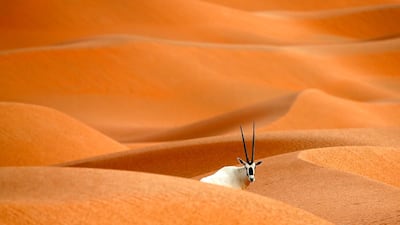The roar of wild animals, iced drinks under the stars and rifles jacked up against backpacks – it sounds like a passage from Ernest Hemingway’s classic safari journal Green Hills of Africa, but only a few miles from the capital in the deserts of Al Ain, hunters from across the globe are legally hunting for trophy game such as Arabian oryx and gazelle.
Telal Hunting opened in 2015 and is based at the Telal Resort in Al Ain. The 80 square kilometre complex also offers safari trips where guests can see these indigenous Middle Eastern animals in the wild. It's the only place in the UAE where these animals can be hunted legally in their natural environment.
Hans Enslin is the hunting manager. “In our boundaries it’s legal to hunt,” he said at the Arabian Travel Market on Monday.
The operation is fully licensed by Abu Dhabi and the numbers visiting are growing. The season runs from October to March and from just 25 paying hunters in 2015, at least 95 came this season – seventy of which are from the GCC and Emirati. Guests also come from traditional hunting communities in Europe, Russia, the US, South America and Mexico.
People do not need shooting experience, but most do and many have a military background. Every hunting guest, no matter what their expertise, is still taken to a shooting range under Mr Enslin’s eye and if he believes the animals won’t be killed cleanly, then the shoot is cancelled.
“We don’t want to wound the animals and let them off into the desert because it’s not what we are about,” he said. In addition to the Arabian oryx, or maha in Arabic, there is the Arabian sand gazelle, or reem, and the Arabian mountain gazelle, or domani.
Telal Hunting provides all equipment – hunting rifles, optics and hunting systems. The area is fenced off from camels to protect the habitat and has been maintained as a natural desert.
If you are a GCC resident, it will cost about Dh3,700 for one gazelle, while oryx is around Dh37,000. If you don’t manage to kill anything, you don’t pay anything. Local guests can take home the meat and while international guests can’t do this, some take home antlers as trophies.
“I can teach. I’ve taken people with no experience, even Emirati ladies,” said Mr Enslin, who is from South Africa and previously worked in the Kruger National Park as a ranger.
The hunting is just one of many activities at the hotel. Also on offer is falconry, houbara hunting with falcons, safari drives, zip lines, sandboarding and archery. The hotel stay is completely separate but you don’t have to stay at the hotel to hunt.
“This whole thing is based on conservation,” said Mr Enslin. “Animals are bred there, but roam freely. Only excess males are hunted.”
When asked about him about whether killing animals for enjoyment is justified, Mr Enslin is firm that hunting allows these animals and their natural habitats to thrive. Otherwise the desert-like environment would simply not be able to sustain them in numbers, he said.
“It’s an age old argument we don’t need. But if it pays, it stays. Hunting is a tool in conservation to make habitat available. The more hunting you have, the more wild animals you have. It’s not just about the animal but also the habitat.
______________
Read more:
Al Ain Zoo names baby rhino after Sudan
Oryx released into sprawling Abu Dhabi reserve
Oman opens sprawling oryx reserve to tourists
______________
“People buy a fish in the market, but they don’t think about where it comes from. But when you see a photograph of a guy with a dead animal it becomes an emotional issue,” he said.
Whatever side of the argument you come down on, it’s clear business is growing. The operation is also present at the annual Adihex hunting exhibition in Abu Dhabi and he attends trade exhibitions across the globe.
Separately, the UAE is committed to conserving oryx and gazelle. Sir Bani Yas Island for example is just of the protected areas where they roam safely in natural habitats.
“We are still building this as hunting is still viewed negatively across the world by different communities. This is the flagship model and if it works, hopefully there’ll be more.”



